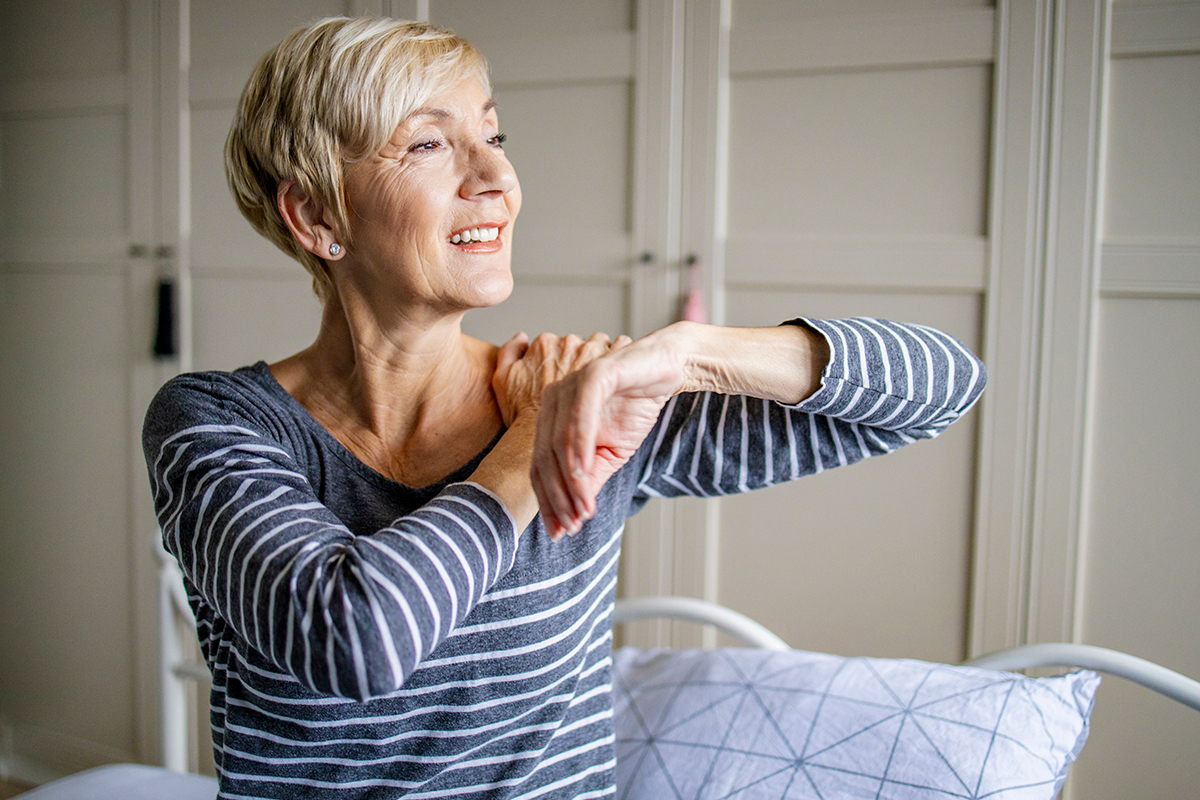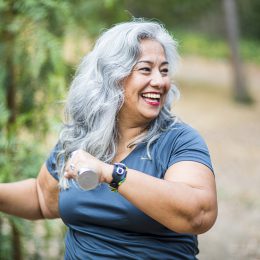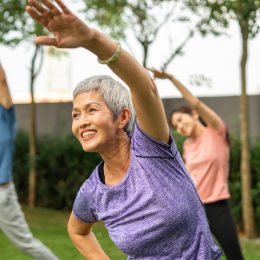The Dos and Don’ts of Exercising with COPD
Follow these basic guidelines to keep your lungs safe and strong.

When you have chronic obstructive pulmonary disease (COPD), a chronic inflammatory lung condition that can make it hard to breathe, exercise might seem like a fast-track to making your symptoms worse. But the opposite is true.
According to research published in the journal Breathe, exercise is the cornerstone of a comprehensive pulmonary rehab program for those with COPD. It improves lung function and can help reduce anxiety and depression, which are common with the condition. Plus, there are ample benefits that come along with a regular exercise routine, including a healthy body weight, more muscle mass, better balance, and improved mobility, according to the Centers for Disease Control and Prevention (CDC).
Still, that doesn’t mean anything goes in terms of a workout. Follow these dos and don’ts when considering an exercise mix that might work best for you.
Do Talk to Your Doctor First
As with any type of chronic disease and exercise, your first step is to talk with your doctor. Your situation is unique in terms of what you need to manage your COPD, so it’s best to get a personalized plan that takes factors like medical history and medications into account.
Definitely get moving. But first, understand how to do so safely and with the best results in mind, says Scott Kaiser, M.D., a geriatrician at Providence Saint John’s Health Center in California. For instance, your doctor can help you set goals and create a plan, especially if you have other conditions in addition to COPD.
Do Aim for Consistency, Not Intensity
If you’ve been taking it easy, it might be tempting to play catch-up and take on a rigorous exercise program, says Kate Ayoub, D.P.T., a physical therapist and health coach with Own Your Movement who often helps people with chronic conditions.
“Think frequency before intensity,” she suggests. “Choose something you can do every day, as opposed to a hard workout that takes you days to recover from.”
Walking for a few minutes is a great place to start. Then tack on a couple more minutes every day, Ayoub says. If you’re on oxygen therapy, be sure to talk to your doctor about how much to use while exercising.
Don’t Ignore Your Symptoms
As you increase your activity, you may notice some short-term effects, such as changes in your energy levels, mild shortness of breath, and a slight increase in coughing as your lungs expand from the activity. But if you experience anything more severe than that, it’s a good indication that you should dial it back, Dr. Kaiser says.
“Paying attention to your body during and after exercise is very important,” he says. “You want to challenge yourself to some degree, but you also have to work with what you’ve got.” Noticing changes, and perhaps even keeping a daily log, can help you see improvements as you progress.
Do Recruit Professionals
From physical therapists who work with COPD patients to pulmonary rehab specialists to respiratory therapists, it’s likely that your health-care provider has professionals who can help you put together a program, Ayoub says. That’s particularly important if you have other conditions, such as cardiovascular issues or diabetes.
“For example, it’s important to know how to breathe when exercising, and respiratory therapists can give you guided exercises to try,” she says.
Don’t Skip Stretching Key Muscle Groups
For those with COPD, it’s especially helpful to focus on stretching the chest and shoulders, Ayoub says.
That’s because people with COPD often find it easier to breathe when leaning forward. But being in a forward flexed position with rounded shoulders can cause stress on your shoulder and neck muscles. Over time, research suggests this can result in chronic pain.
Take a few minutes throughout the day, particularly before exercise, to do gentle stretches that alleviate some of this tightness. Ayoub recommends this seated cat-cow sequence:
• Sit on the edge of a chair with feet flat on the ground and hands gently resting against your hips.
• Take a deep inhale and slowly arch your back, pull your shoulder blades together, and expand your chest. Keep your head in line with the spine and begin to look up.
• On your exhale, slowly round your back, push your shoulder blades apart, and pull in your belly. Think of making a C-shape with your spine.
• Repeat 3 to 5 times; try to tie your movement to your breath.
Subscribe to our newsletter
It's quick and easy. You could be one of the 13 million people who are eligible.
Already a member? Click to discover our 15,000+ participating locations.
Follow Us
Do Make It Social
One great way to prevent yourself from falling into a rut is to do group exercise, such as SilverSneakers LIVE classes, or recruit a friend or family member for a walk outside.
Finding others who also have COPD can be especially valuable, Ayoub says. “Not only can you trade ideas about what’s worked, but you tend to motivate each other,” she says. “That might help you to do just a little bit more than you might otherwise.”
Need help finding a workout buddy? Join the COPD Foundation’s active online community COPD360social to connect with people near you, ask questions, and receive support.
Don’t Be Afraid to Play
For many people, the words “exercise” and “fun” only occur together in the dictionary. But enjoying the activities you choose can offer a huge boost.
Dr. Kaiser suggests exploring different types of fitness, including strength training, cardio, yoga, dancing—basically anything that gets you moving and helps you feel engaged with the activity.
Take Your Favorite SilverSneakers Classes Online!
SilverSneakers members can access live fitness classes and wellness workshops through SilverSneakers LIVE. See the latest schedule and RSVP for classes here.
Not a member? If you have a Medicare Plan, it may include SilverSneakers—at no additional cost. Check your eligibility instantly here.




